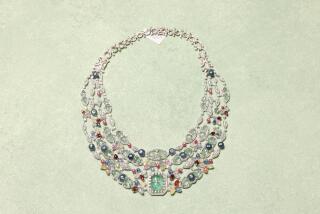Quick Cash : Fast-Track Now Leads Only to Pawnshops
- Share via
NEW YORK — Pawnshops are increasingly becoming home to the gold that made the 1980s glitter as layoffs rack Wall Street and other industries.
But after years of being rudely portrayed by Hollywood as a usurious business preying on the impoverished, the pawnbroking industry is loath to be seen as a leading recessionary indicator.
Lincoln Square Pawnbrokers is an example of the boom. Newly hard-pressed New Yorkers have contributed to a 10% jump in unreclaimed valuables hocked this year at the tiny pawnshop.
“This is the largest increase in 15 years,” said owner Gary Kalter. He said gold jewelry is his most frequently pawned item.
Kalter is not alone in reaping a windfall from the weak U.S. economy. Many of the roughly 8,000 U.S. pawnbrokers report that white-collar professionals who just a few years ago wouldn’t be caught dead near their shops are skulking in to hock their Rolex watches, diamond rings and other symbols of the fast-cash ‘80s.
Many of these former high-fliers--including lawyers, developers and real estate agents--need cash to buy Christmas gifts or other luxury items but have exceeded their credit card limits.
But, while business is booming across the nation, times are decidedly mixed in New York City. Tough state regulations and high rents have helped reduce the number of pawnshops from 120 in 1940 to 20 in 1980 to just 15 in 1990.
Squeezed between a peep-show store and a Pizza Hut, S&G; Gross Co. in mid-town Manhattan writes about 100 loans a day, or about 25,000 a year.
A loyal customer base has helped the four-generation business remain in the hands of Robert Gross, 71, and his son Gary, 46.
Tapping the shop’s new computer system, Gary notes that keeping track of customers’ loans has cut down on some of the haggling.
More to Read
Inside the business of entertainment
The Wide Shot brings you news, analysis and insights on everything from streaming wars to production — and what it all means for the future.
You may occasionally receive promotional content from the Los Angeles Times.










